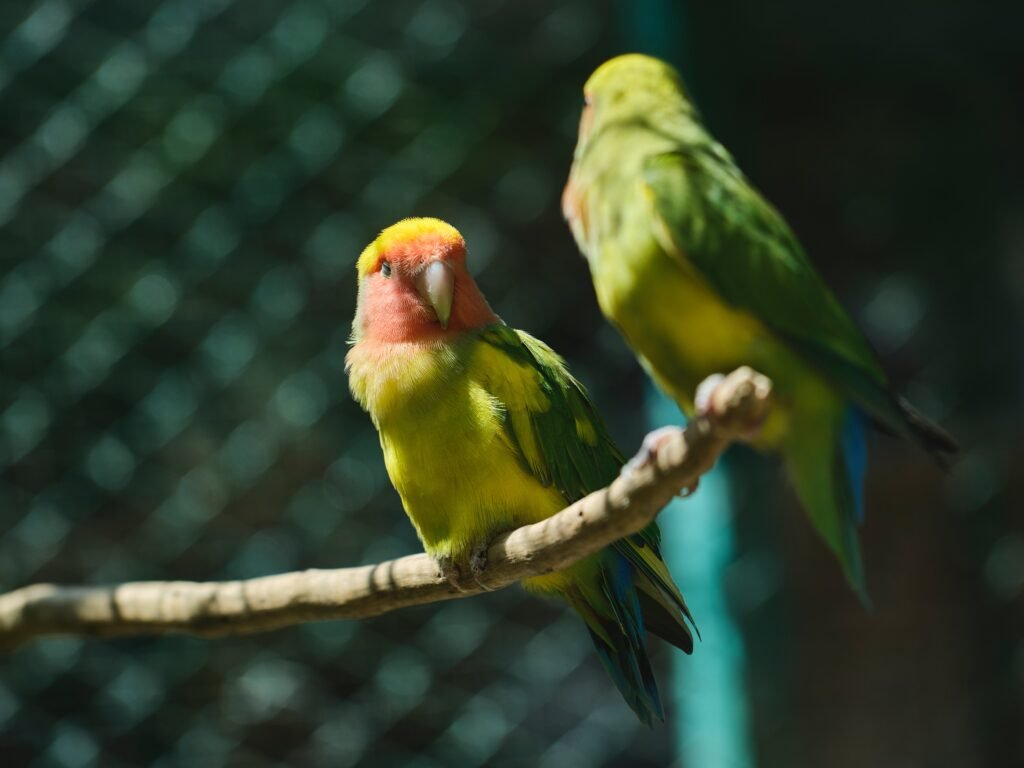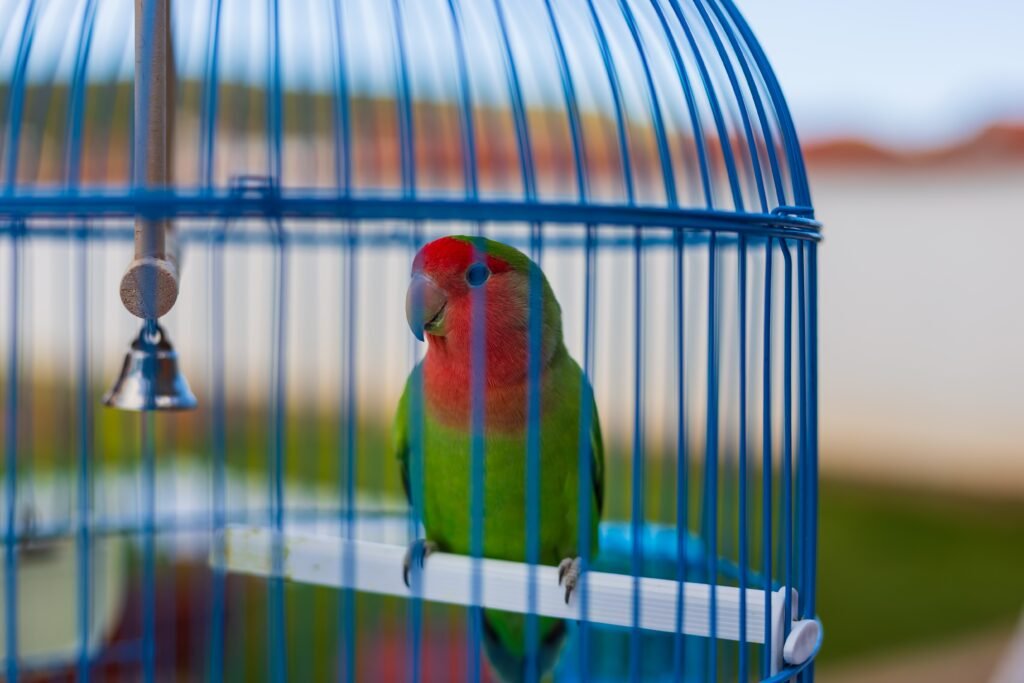Lovebirds, known for their vibrant plumage and affectionate behavior, are also fascinating creatures when it comes to their intelligence. These small parrots have captivated bird enthusiasts worldwide with their playful antics and ability to learn new skills. In this article, we will delve into the intelligence level of lovebirds and explore the various aspects that make them truly smart companions.
- Problem-Solving Abilities
Lovebirds display remarkable problem-solving abilities, showcasing their intelligence in various situations. They possess a keen sense of observation and can quickly adapt to their environment. Their problem-solving skills become evident when encountering obstacles in their cages or foraging for food.
These avian wonders have been observed utilizing tools to accomplish tasks. For instance, they can use sticks or twigs to retrieve food from hard-to-reach places. Their ability to think critically and find creative solutions to challenges is impressive.
Furthermore, lovebirds’ innate curiosity drives them to explore their surroundings, seeking new opportunities and challenges. This natural curiosity contributes to their problem-solving abilities, as they actively engage with their environment to find solutions.
In addition, lovebirds’ exceptional problem-solving abilities are not limited to physical challenges. They are adept at solving social problems within their flock or interacting with their human companions. Their intelligence allows them to navigate complex social dynamics and form strong bonds with their mates and fellow flock members.
- Social Intelligence
One of the captivating aspects of lovebirds is their strong social intelligence. These birds form monogamous pairs and develop deep bonds with their mates. They engage in intricate courtship rituals, and their affectionate behavior towards each other is a testament to their emotional intelligence.
Lovebirds’ social intelligence extends beyond their relationships with their mates. They also exhibit remarkable communication skills, using a combination of vocalizations, body language, and displays of affection to convey their feelings to their partners and fellow flock members. Lovebirds can form lasting relationships and thrive in a group by understanding and responding to these social cues.
Their ability to connect and communicate with others is not limited to their species. Lovebirds can also develop strong bonds with their human companions, displaying emotional intelligence that allows them to understand and respond to human emotions.
Furthermore, lovebirds’ social intelligence enables them to engage in cooperative behaviors. They often work with their mates or flock members to achieve common goals, such as foraging for food or building nests. This collaborative nature highlights their intelligence and ability to navigate complex social interactions.
- Vocal Mimicry
Lovebirds possess an impressive talent for vocal mimicry. While they may not match the mimicking abilities of larger parrot species, they can still imitate a wide range of sounds and human speech to some extent. This ability showcases their cognitive abilities and highlights their capacity to learn and reproduce complex sounds.
Lovebirds often mimic the sounds they hear frequently in their environment, such as household noises or song melodies. This talent adds an entertaining aspect to their repertoire and demonstrates their intelligence.
In addition to mimicking sounds, lovebirds can also learn to associate specific vocalizations with certain actions or objects. For example, they can be trained to respond to a particular sound cue, such as a whistle, by performing a specific behavior. This ability to learn and associate vocalizations with actions highlights their cognitive abilities and reinforces their intelligence.
- Problem-Solving Toys and Enrichment
To stimulate their intelligence and keep them mentally engaged, lovebirds must be provided with problem-solving toys and enrichment activities. These can include puzzle toys, foraging devices, and interactive games that require the birds to use problem-solving skills to obtain rewards.
Incorporating such activities into their daily routine keeps lovebirds mentally stimulated and prevents boredom and behavioral issues. It allows them to fully exercise their cognitive abilities and explore their problem-solving potential.
Furthermore, providing a variety of toys and enrichment activities can help prevent cognitive decline in lovebirds as they age. Like humans, lovebirds benefit from mental stimulation, and engaging with problem-solving toys and activities can help keep their minds sharp and active.
- Training Lovebirds
Lovebirds are highly trainable due to their intelligence and eagerness to learn. With patience, consistency, and positive reinforcement techniques, these birds can be taught various tricks and commands. Simple commands such as “step up” or “wave” can be easily mastered by lovebirds, while more complex behaviors can be trained with time and effort.
Training lovebirds strengthens the bond between the bird and its owner and provides mental stimulation for the bird. It allows them to showcase their intelligence and keeps them mentally and physically active.
In addition to teaching tricks and commands, training lovebirds can also help address behavioral issues. Training can prevent or reduce problem behaviors such as excessive chewing or aggression by redirecting their intelligence and energy towards positive behaviors.
- Lovebirds and their Environment
Creating a stimulating and enriched environment is crucial for lovebirds’ overall well-being and intelligence development. Providing a spacious cage with plenty of toys, perches, and interactive elements ensures these birds have ample opportunities to explore and engage in activities that challenge their intelligence.
In addition to physical enrichment, lovebirds also benefit from mental stimulation through environmental enrichment. This can include providing opportunities for problem-solving, such as hiding treats inside toys or creating foraging opportunities that require the birds to use their intelligence to obtain rewards.
Additionally, a varied and balanced diet is essential for their cognitive development. Offering a diverse range of fruits, vegetables, seeds, and pellets provides the necessary nutrients to support their brain health and cognitive functions. A healthy diet contributes to their overall intelligence and ensures their well-being.
Conclusion
Lovebirds are undoubtedly intelligent creatures. They are capable of problem-solving, exhibiting social intelligence, mimicking sounds, and learning through training. Their inquisitive nature and ability to adapt to new situations make them fascinating companions. Understanding and nurturing their intelligence can provide lovebirds with a fulfilling and enriched life, ensuring their mental well-being and happiness. So, next time you observe your lovebird’s playful behavior or witness its problem-solving skills, remember that these adorable birds are a testament to the remarkable intelligence found in the avian world.
FAQ
1. Can lovebirds solve problems?
Yes, lovebirds display remarkable problem-solving abilities. They possess a keen sense of observation and can quickly adapt to their environment. Their problem-solving skills become evident when encountering obstacles in their cages or foraging for food.
2. Are lovebirds socially intelligent?
Yes, lovebirds have strong social intelligence. They form monogamous pairs and develop deep bonds with their mates. They exhibit remarkable communication skills, using vocalizations, body language, and displays of affection to convey their feelings. Lovebirds can also form bonds with their human companions.
3. Can lovebirds mimic sounds?
Yes, lovebirds possess an impressive talent for vocal mimicry. While they may not match larger parrot species, they can imitate a wide range of sounds and human speech to some extent. They can also associate specific vocalizations with certain actions or objects.
4. How can I stimulate my lovebird’s intelligence?
To stimulate their intelligence, provide lovebirds with problem-solving toys and enrichment activities. Puzzle toys, foraging devices, and interactive games that require problem-solving skills can keep them mentally engaged. Mental stimulation throughout their lives can help prevent cognitive decline and keep their minds sharp.
.


